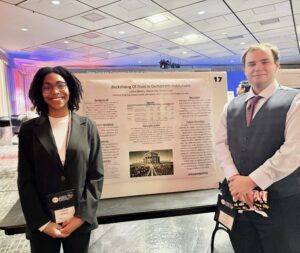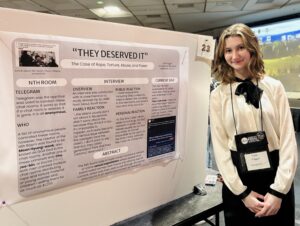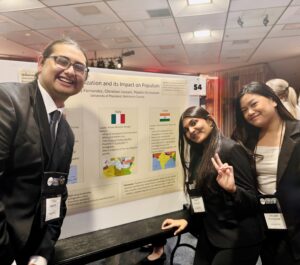Real-World Research
Early exposure to research enhances our students’ readiness for graduate school and their chosen career paths. More importantly, independent research under the mentorship of UMBC’s dedicated, talented faculty members can spark a student’s lifelong interest in interdisciplinary learning.
Check out undergraduate research completed by past Global Studies Majors!
At UMBC, we back up our commitment to undergraduate research with grant awards and faculty support, so that research can be a part of any undergraduate’s learning experience. Each spring, student researchers have an opportunity to present their work at Undergraduate Research and Creative Achievement Day.
GLBL URCAD Presentations: Spring 2025
Five Global Studies students presented their research at URCAD XXIX on 15 April 2025
Backsliding Of Trust In Democratic Institutions
Juliana Blakely First year, Global Studies/Political Science Double MajorMentor: Carolyn Forestiere, Political Science
First year, Global Studies/Political Science Double MajorMentor: Carolyn Forestiere, Political Science
Recent years have seen a notable rise in democratic backsliding, coupled with a decline in public trust in democratic institutions worldwide. This research aims to find evidence as to why this phenomenon of democratic decline exists, as well as why citizens of democracies have lost trust in their institutions. Using data provided by the World Values Survey, Freedom House, and V-Dem, this study examines the public trust of Germany, Italy, Hungary, and the United Kingdom’s democratic institutions to better understand the governmental trends associated with loss of confidence in important political institutions. The research shows that democratic decline was not necessarily associated with the election of right-wing political leadership, as between nations with both right and left-wing governments, loss of confidence in democratic institutions was relatively uniform across the board regardless of political identity, with the highest degree of trust being found within the judicial branches, and lowest in the legislature. These trends raise further questions as to the cause of this democratic backsliding, as well as potential avenues of restoring trust in democracy via alternative methods of governance such as that of technocracy, similar to that of the Italian government during the COVID-19 Pandemic.
Juliana was the recipient of a UMBC Travel Award from the UMBC Division of Undergraduate Academic Affairs
South Korea’s Nth Rooms
Faith Fagan First year, Global Studies Major
First year, Global Studies Major
Mentor: Zareen Taj, Global Studies
The Nth Room case in South Korea was a major cybercrime involving the sexual exploitation of women and minors on Telegram. From 2018 to 2020, criminals, including the leader “Baksa” (Cho Ju-bin), blackmailed victims into creating explicit content, which was then sold to paying members. The case revealed a disturbing network of cybersex trafficking, where perpetrators used coercion, threats, and doxing to control victims. Despite progress, concerns remain about similar crimes on hidden online platforms, highlighting the need for strict enforcement and continued awareness.
Globalization And Its Impact On Populism
Christian Jassani
Third year, Global Studies/Political Science Double MajorMentor: Carolyn Forestiere, Political Science
This research focuses on the correlation between globalization and the rise of right-wing populist governments across the globe. Using a most different system design, we examined the countries of India, Italy, and the United States. Despite having different population sizes and democratic political systems, all three countries have experienced an influx of immigration and are currently led by leaders who are right-wing populists. Using data that measures the immigration rates within the countries and the World Values Survey to understand how citizens think about immigrants, we attempt to explain the reasons for the emergence of nationalist parties. Additionally, we looked to the political science literature to understand the history and current developments within the countries to explain the rise of nationalism. We argue that the rise of immigration in these three countries has created an environment that exacerbates economic paranoia and fear of losing national identity, which, as a result, has created fertile ground for populism to emerge within these specific countries.
This work was funded, in part by, Center of Global Engagement at UMBC.
Balochistan: A Silent Resistance
Ayan Shaikh
Transfer, first year
Mentor: Zareen Taj, Global Studies
Produced as a project for the Documentary Film as Activism seminar (GLBL409), this film aims to educate and raise awareness about the evolution of oppressive ethnic, class, and state systems that have shaped the Balochi struggle in Pakistan. Creating this film deepened my passion for the subject and reinforced my commitment to sharing the daily adversities faced by the Baloch people. Acknowledging the severe deterioration of their socio-political condition is imperative.
The documentary encompasses a concise historical overview of Balochistan’s contested past and a portrayal of its current landscape. Through the film, I hope to provide viewers with a comprehensive understanding of what it means to be Balochi and the current lived experiences of this resilient community.
B-Type Stars In M45: Hydrogen Balmer Absorption, Isochrone Fitting, And Radial Velocity Discrepancies
Timothy Winans,
Transfer, first year; Global Studies/Physics Double Major
Mentor: Kenny Diazeguigure, Howard Community College; Brendan Diamond , Howard CC
B-Type stars in M45 were targeted for ground-based spectroscopic and photometric observation. Spectral analysis at ≈ 4.2 × 102 – 7.4 × 102 indicated the presence of strong hydrogen Balmer absorption lines (Hα, Hβ, Hγ, Hδ) in observed line strengths and spectral slopes consistent with theoretical models and previous observations of early main-sequence stars. Results of Isochrone fitting of M45 were consistent with contemporary stellar evolutionary models for B-type stars. GAIA DR3 data on the 9 B-Type stars was queried and calculated for comparison using Astropy and NumPy to derive stellar properties for 7 of the 9 targeted B-type stars. Discrepancies were observed between existing published radial velocities in SIMBAD forMerope (23 Tau) and Electra (17 Tau), and the calculated radial velocities derived from GAIA DR3 data.
PRESENTING YOUR RESEARCH
UMBC Undergraduate Research and Creative Achievement Day – URCAD (Submission deadline usually in February, Event at UMBC in April)
PUBLISHING YOUR RESEARCH
UMBC Review (Submissions accepted in early fall)